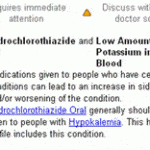by Susannah Fox | Jul 13, 2010
Update: The NLM released new widgets on July 14, along with a redesigned MedlinePlus site. (Read @eagledawg’s take on these new tools, as well as her response to this post.) Speaking to the senior staff of the National Library of Medicine last week was like...
by e-Patient Dave | Jul 7, 2010
Did you know that a major aspect of the Affordable Care Act (aka the health reform legislation) was significant funding to revamp primary care? I’m embarrassed to say I didn’t. There’s $10 billion (with a B) in funding for research in the first ten...
by e-Patient Dave | May 18, 2010
Patient networks for the win! MIT Technology Review: “Earlier this month, the journal Lancet Neurology published a study showing that the generic drug lithium did nothing to slow the course of ALS … Eighteen months earlier, PatientsLikeMe, a for-profit...
by e-Patient Dave | May 8, 2010
This is an essay I (mostly) wrote April 28 on Vince Kuraitis’s e-Care Management Blog, part of his series with David Kibbe MD about the Federal EMR incentives, titled “Is HITECH Working?” The series is, in my opinion, the most useful update...
by Gilles Frydman | Apr 2, 2010
Participatory Medicine is a movement in which networked patients shift from being mere passengers to responsible drivers of their health, and in which providers encourage and value them as full partners. This new definition devised by the board of the Society of...
by Danny Sands, MD | Mar 8, 2010
A joint post by e-Patient Dave and Dr. Danny Sands, written from alternating points of view. Danny: An important moment happened a few months ago during office hours – important because it brought a profound shift in Dave’s view of the doctor-patient...
by Gilles Frydman | Nov 12, 2009
The FDA is holding a public hearing on the “Promotion of FDA-Regulated Medical Products Using the Internet and Social Media Tools.” There is a tremendous amount of buzz on Twitter and blogs about this meeting which will hear 60 speakers, some more than...
by Danny Sands, MD | Nov 9, 2009
For most people, their impetus to be actively engaged in healthcare comes from an experience with serious illness—either their own or a loved one’s. My journey into participatory medicine began during my internal medicine residency at Boston City Hospital, a public...
by Susannah Fox | Aug 18, 2009
Federal agencies can, and should, be the first responders to health questions. Social media can help. That’s my summary of presentations from last week’s National Conference on Health Communication, Marketing and Media conference, where I had the sense,...
by Susannah Fox | Jul 16, 2009
The National Institutes of Health hosted a Wikipedia Academy today to train scientists, communications staff, and other NIH staffers in how to contribute to what has become a top source for health information in the U.S. (For more details, please see the NIH press...
by e-Patient Dave | Jun 19, 2009
Next anecdote about poorly managed medical data: Amen! Just had an incident where my SS# was attached to a different patient’s name in the electronic med record. And the health facility will not tell me where the error occured, or how long someone else’s name was...
by Sarah Greene | May 11, 2009
My son graduated from college last year and is now in Nepal, visiting schools and writing about rural education under the Maoist regime. He was excited to tell me, when I visited him recently in India, about how a classic book on education, Pedagogy of the Oppressed...
by Gilles Frydman | Apr 3, 2009
Amy Marcus, in today’s WSJ, wrote a powerful article about a mom moving medical mountains to help her twin daughters survive a rare and deadly disease. Entitled “A Mom Brokers Treatment for Her Twins’ Fatal Illness. Bucking Scientific Convention,...

by e-Patient Dave | Apr 1, 2009
This is a complex post, so don’t jump to any conclusions. Two weeks ago (gad, was it that long?) I asked you to think about something for a few days: Imagine that for all your life, and your parents’ lives, your money had been managed by other people who had extensive...
by Gilles Frydman | Mar 17, 2009
In our continuous series about undeclared conflicts of interest comes a great blog post from the Wall Street Journal. In it JAMA’s editor in chief, Catherine DeAngelis, M.D, interviewed about a certain Jonathan Leo, had these choice words to describe him:...
by e-Patient Dave | Jan 18, 2009
This topic isn’t directly in our wheelhouse here in the e-patient movement (“empowered, engaged, equipped and enabled”), but as I continue one patient’s odyssey in learning about healthcare, a discussion on Paul Levy’s blog has taught me...
by Christine Gray | Dec 27, 2008
Are women dying of cancer in the same way they die of heart disease, because physicians trivialize their complaints and they are powerless to get second opinions? How many decades has it taken for cardiologists, practitioners at the apex of medicine, to acknowledge...
by e-Patient Dave | Jul 28, 2008
Medpedia has gotten a lot of publicity in the past week. Considering that Wikipedia has disavowed* usefulness for patients, Medpedia sounds like a potentially great idea. * See Jon’s correction in Comments. –EPD But when I saw their home page it literally...
by Susannah Fox | May 15, 2008
I think participatory medicine is what Eric Raymond calls a “plausible promise”: something big enough to inspire interest yet achievable enough to inspire confidence. Reforming health care is too big for most people to grasp; creating spaces for participatory medicine...
by John M. Grohol, Psy.D. | Apr 9, 2008
David Brown over at the Washington Post wrote an article yesterday noting that prevention isn’t necessarily cheaper than “doing nothing” and letting people get sick. Well, “Duh,” I say. Prevention is an intervention, it’s just an...






Recent Comments